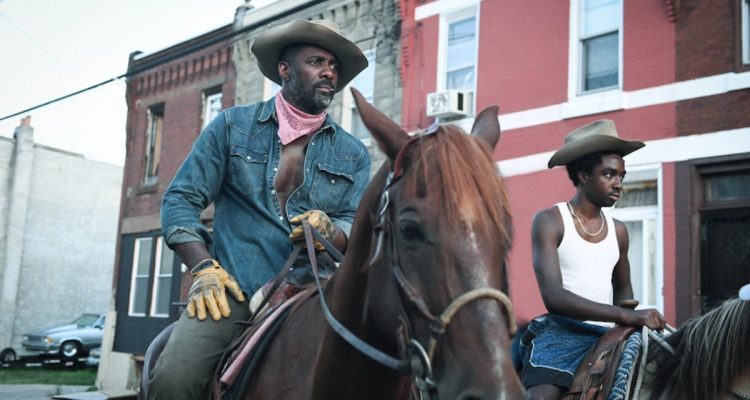No genre romanticizes America’s manifest destiny mythos more than the western. For decades, the construct featured white men conquering the frontier from Native Americans and law enforcement. In fact, no image in the American lexicon espouses freedom more than the cowboy, and from the 1860s through the 1880s, Black people accounted for 25% of cowboys. But Black folks — other than having films like “Buffalo Soldiers,” “Buck And The Preacher,” and “Bull” — have mostly been erased from the cinematic and American history of the west. Because for a race that’s been dehumanized more often than not, the totemic cowboy ran counter to the seizure of Black freedom instituted by white people. In short, a Black person on a horse is an inherent statement against oppression.
READ MORE: Toronto International Film Festival 2020 Preview: 15 Films To Watch
But the cowboy way of life still exists in some contemporary pockets, and not just in Texas. Cole (Caleb McLaughlin, of “Stranger Things” fame) is a troubled kid living in Detroit. Routinely involved in fights at school, and now in danger of expulsion, as a last ditch effort to save him from himself, Cole’s mother leaves him in Philadelphia for the summer to stay with his cowboy father Harp (Idris Elba). Cole arrives in a different world; a crumbling one. And in the process, he struggles to reconcile with his absentee father and abandon his childhood friend Smush (Jharrel Jerome).
READ MORE: 2020 Fall Film Preview: 40 Most Anticipated Films To Watch
Rusty Staub’s directorial debut “Concrete Cowboy” — adapted from Greg Neri’s novel “Ghetto Cowboy” — is a genre bender of an urban western, which lovingly depicts a way of life surviving its adverse environment, yet falls just short of the emotional heights his film’s many components tease.
When Cole’s mother leaves him at his father’s doorstep, with only two trash bags filled with his clothes to his name, he’s returning to a place he barely recalls. Even so, the community remembers him. For instance, his father’s next door neighbor Nessi (Lorraine Toussaint) — the owner of the Fletcher Stables — immediately recognizes Cole, even after his fifteen-year absence. His troubled cousin Smush also comes to his aid, enveloping him in a criminal lifestyle — much to the protests of Harp.
READ MORE: Telluride 2020 Selections: Canceled Festival Would Have Featured Films From Gia Coppola, Chloé Zhao & Francis Lee
Cole, as with these urban cowboys, is stuck between two worlds: the streets and nature. The first hour of “Concrete Cowboy,” which sees Cole oscillating between the worlds of Smush and Harp, drags at an interminable pace. For example, the cycle of Harp denouncing Cole’s nightly absences — evenings when the teen and Smush are encroaching upon the territory of a local gangster for their own profits — becomes repetitive. There’s also an extended scene where Cole, a character building moment, is tasked with cleaning out the stables. The sequence stretches on for far too long.
But “Concrete Cowboy” is a beautiful film to look at. Minka Farthing-Kohl’s photography captures evocative images of silhouette cowboys against the violet sunset sky, and daylight drenched wide shots of the colorful row houses that adorn the narrow gritty streets. This Philadelphia neighborhood is trapped between eras, a mixture of parked cars and horses tied to stoops decorate its curbsides. And in other instances, the line between urban and western blur even more, such as Harp and Cole making a fire-lit campsite against graffiti cement walls. “Concrete Cowboys” is a lyrical film, and its gorgeous images, which immerse us in a unique way of life, alone, nearly makes the movie worth watching.
But an emotional through line is missing amongst the compelling sights. And I’m not sure how or why. The requisite pieces exist: This is a community desperately fighting against the gentrifying white authorities who’d rather the neighborhood’s noxious smelling stalls were no more. Smush — given a fierce performance from Jerome that’s somewhat reminiscent of his breakout role in “Moonlight” — dreams of founding a ranch of his own based on the illegal money he’s making. Harp and Cole share poignant heart-to-hearts to repair their relationship. In a partnership that brings memories of “Lean on Pete,” Cole begins to form a bond with his irritable horse Boo, and comes of age. Every character, in their own way, is striving for the freedom these horses represent. But their touching storylines never coalesce.
It’s as if too much is happening. For example, at one point, the urban western briefly morphs into a heist flick, and at another, leans heavily into the gangster sub-genre. A stellar performance from McLaughlin, and a familiar score by Kevin Matley — who utilizes a theremin and makes clear odes to Ennio Merricone — holds the brimming narrative together, even when it should gallop away. Another thoughtful touch includes using actual Fletcher Stable riders like Jamil “Mil” Prattis — playing the wheelchair bound Paris — and Ivannah Mercedes, as the confident friend to Cole, Esha. But those gains are often undone by a hamfisted subplot involving a local Black cop searching for what side to land on: law enforcement or his community — and the end’s contrived lesson.
Staub’s “Concrete Cowboy” is a film I admired more than I loved. At times, the urban western offers marvelous shots but struggles to match its poetry with definition: What does freedom truly mean for these Black cowboys? The answer given leaves one wanting. Even so, “Concrete Cowboy” breathes new life into the western genre and sheds a brighter light on a faction of Black culture that was largely unknown by white audiences until today. [C+]
Follow along here for all our coverage of the 2020 Toronto International Film Festival.

